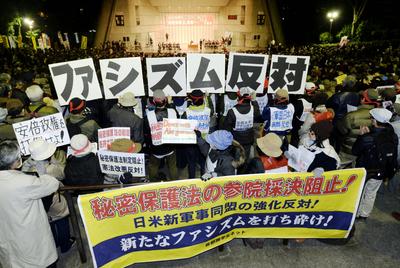Outside, mass demonstrations against the law were organised by leftist groups during the Diet debate. An opinion poll showed that 82 per cent of those surveyed considered revision or abolishment of the PSS Act necessary.
The Abe government argues that the law is necessary to share intelligence and information on national security with Japan’s allies. The PSS Act is expected to support Japan’s National Security Council (NSC), which, since December 2013, began controlling information and strengthening secrecy on national security. While national security requires some degree of secrecy, domestic opposition to the PSS Act is fierce, notably affecting Abe’s popularity.
Why does the public oppose the Act? Some critics draw an analogy with the 1925 Maintenance of the Public Order Act. The use of this analogy even after nearly a century suggests a difficult relationship between secrecy in national security and liberties in Japanese contemporary society.
The 1925 Act was a symbol of Japan’s prewar oppression of freedom of speech and the press. It was initially introduced to suppress Japanese communists, as the Japanese government became suspicious of the international communist movement at that time. In practice, it suppressed all anti-government political movements and changed prewar Japan into a totalitarian regime. In the name of national order, censorship and torture were employed and freedom of speech and the press oppressed.
According to a report, more than 75,000 people were arrested and sent to the public prosecution under the law between 1925 and 1945. The loss of freedom of speech and the press also contributed to the rise of militarism in prewar Japanese society and Japan’s military expansion through the Asia Pacific. After the war, the new constitution upheld human rights and ensured freedom of speech and the press.
Unlike the 1925 Act, the PSS Act was enacted for national security reasons, not on the justification that a hostile ideology needed to be suppressed. It requires Japanese government officials who deal with national security issues to keep specified information on national security secret from the public. The specified secrets range over four categories: diplomacy, defence, counterintelligence and counterterrorism. The right to determine secrecy of information is vested in the executive. The law also imposes high penalties: up to 10-years imprisonment, for both government officials who leak specified secrets and civilians who attempt to obtain it from them.
The PSS Act seems to have become a symbol of an Abe government nationalist policy program against domestic discourse, rather than national security. Until now, postwar Japanese society has enjoyed relatively free debate on national security issues. It is not surprising that Japanese mass media and academia is showing strong concerns with this law.
The PSS Act also comes in the context of an Abe government that is seeking to revise Japan’s pacifist constitution and the role of the Japan Self-Defense Forces — something that has also been seen as moving away from Japan’s postwar democratic values. But as the 2012 national election showed, the Japanese public supported the Abe-led Liberal Democratic Party not because of its conservative ideology or position on security policy but because of practical expectations that it would reinvigorate a stagnated Japanese economy. The Abe government’s preoccupation with constitutional revision demonstrates the ideological division between present political elites and the public.
The lack of substantive debate on the relationship between national secrecy and civil liberties has only exacerbated the Japanese public’s fears and distrust of their government. There are already existing laws that limit disclosures of information by public officials, such as the National Public Service Act. The Abe government has avoided broad public debate on why another law is needed, and claimed that enacting the PSS Act is necessary to support the creation of the NSC. The contents of the PSS Act itself, however, remain ambiguous. Who decides what is secret and how remains unclear.
For these reasons, the PSS Act could be seen as an attempt to revive aspects of the 1925 Public Order Act.
Balancing secrecy in national security and civil liberties is a sensitive task; success is closely related to past experience and present government–civil relationships. Consensus between the national government and the public will be necessary to resolve the domestic stand-off. Without this, national security institutions will not be supported by the public, and this will have a negative impact upon national security. Judicial safeguards would be an important way of regaining public confidence, and are necessary to prevent the new law from being misused. Amendments to the law that reflect some of the public’s genuine concerns, as brought out in balanced public debate, should be made. Failing this, memories of Japan’s past may continue to colour the Japanese public’s perceptions of the present.
Toshiya Takahashi is a PhD candidate at the National Security College, Australian National University.

